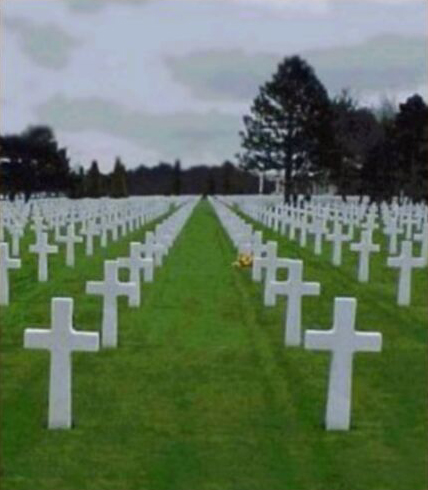

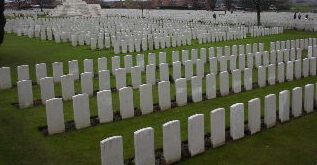
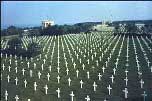
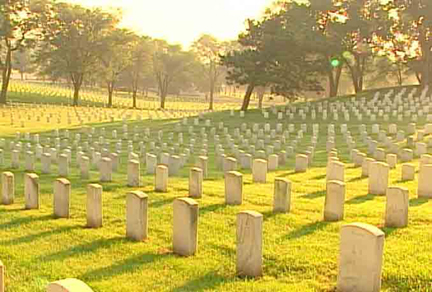
"We feel in wartime comradeship. We confuse this with friendship, with love. There are those who will insist that the comradeship of war is love—the exotic glow that makes us in war feel as one people, one entity, is real, but this is part of war's intoxication. Think back on the days after the attacks on 9-11. Suddenly we no longer felt alone; we connected with strangers, even with people we did not like. We felt we belonged, that we were somehow wrapped in the embrace of the nation, the community; in short, we no longer felt alienated. As this feeling dissipated in the weeks after the attack, there was a kind of nostalgia for its warm glow and wartime always brings with it this comradeship, which is the opposite of friendship.
Friends are predetermined; friendship takes place between men and women who possess an intellectual and emotional affinity for each other. But comradeship—that ecstatic bliss that comes with belonging to the crowd in wartime—is within our reach. We can all have comrades. The danger of the external threat that comes when we have an enemy does not create friendship; it creates comradeship. And those in wartime are deceived about what they are undergoing. And this is why once the threat is over, once war ends, comrades again become strangers to us. This is why after war we fall into despair."
-from a text of a speech by Chris Hedges
(author of "War is a Force That Gives Us Meaning")
yikes! Happy Creepy Remembrance Day.
I used to torture friends and family by reciting Flander's Fields at top speed over and over and over. Chalk it up to youthful cynical exuberance. I stopped doing it recently when I fell in love with a 2nd generation European. WW II feels closer to me these days than it ever has before, and my old, glib irreverence is shifting into something more like fretful curiosity.
I think it's a dreadful poem, and I remember having to memorize it as well. I have a pretty good grasp of WW2 history, though more about the European war than the Pacific war (Americans have a better handle on the Pacific, although very early on Canadians were imprisoned in Hong Kong as the result of a hopeless operation directed by the Brits).
It's WW1 that still eludes my understanding (and most historians). Margaret MacMillan's book "Paris 1919" is a great source for an analysis of the peace talks that followed that war and all it's consequences for the 20th & 21st century.
Like the English, I still think that WW2 is a current event, but after reading MacMillan's book and finding out that Iraq, and many of the Gulf oil states had their beginnings negotiated by the Brits, French, Americans and Italians, I'm willing to say that WW1 is also a current event.
I should qualify my "pretty good grasp" claim, because I learn something new about the world wars all the time. I recently read a book called "Dangerous Patriots" (that Sally lent me) about the secret war-time internment of Canadian labour organizers and communist party members, and it pointed out that prior to WW2 the Soviets had campaigned to the League of Nations for a pact to stop Nazi aggression. The European nations had refused, in the hope that the Nazis would turn their war machine on the Soviets. I had known that business & Industry leaders were more threatened by Communism than by Fascism, but I had never made the connection between those motivations and Chamberlain's Munich Pact with Hitler, paving the way to the Nazi take over of Czechoslovakia.
(so I mention this tidbit one day to Von Bark, and he said, "yes, I knew that.")
Well that's extremely interesting (I didn't read that book myself). LM, you and VB both have encyclopedic data banks in your brains. I am in constant awe.
Don't be in awe, of me anyway, I read way too fast, copy and paste a lot and ultimately retain very little.
I haven't read MacMillan's book yet but John Cale's album 'Paris 1919' is really cool.
- Von Bark
I finally found this quote, I was thinking of it while I was collecting war grave images. It's from Rich Tillman's eulogy delivered at the funeral for his brother, Pat Tillman, the American athlete turned soldier, who was killed (by friendly fire) in an ambush in Afghanistan in the Spring of 2004.
"Thanks Pat. I didn't write shit because I'm not a writer. I'm not just going to sit here and break down on you. But thanks for coming. Pat's a fucking champion and always will be. Just make no mistake, he'd want me to say this: He's not with God. He's fucking dead. He's not religious. So, thanks for your thoughts, but he's fucking dead."
The great lesson of the War to End All Wars is that they don't. From WW2, to the breakup of Yugoslavia to Gulf Wars 1 and 2, it's clear that war usually begets war. Sometimes (e.g. France v. Germany) people show enough enlightenment to break the cycle.
BTW, a great uncle survived WW1, and went on to die of the Spanish flu. Catch-22. That's some catch.
Hey Mark, I did read that the Spanish Flu killed more people that WW1.
I'm not going to peg France & Germany's current civil relationship as a result of their enlightenment. We actually have to give credit to the Americans for that.
The Marshall Plan was designed to rebuild the European economy in the image of American Capitalism before Stalin could take advantage of post war instability. It was a disgustingly expensive enterprise for the Americans, but they had learned some lessons from the WW1 peace agreements. (But I don't buy the argument that the Versailles treaty calling for enormous payments from Germany to the victorious European nations crippled Germany's economy and directly resulted in WW2. From what I have read, the payments stopped in the early thirties, and Germany started building up their armed forces and dressing them in gorgeous Hugo Boss uniforms with those full length leather trench coats. They found the money for that even before they discovered the economic advantages of slave labour).(But correct me if I am wrong)
A few years ago, on my favourite TVO program, Diplomatic Immunity, they discussed the historical impact of WW1. Aside from some dark humour about "the war to end all wars", one of the panel members pointed out that in the 20th century, Germany started two huge wars in order to dominate Europe, they lost both of them, and still ended up the dominant economic power in the new European Union at the end of the century.
freeway blogger:
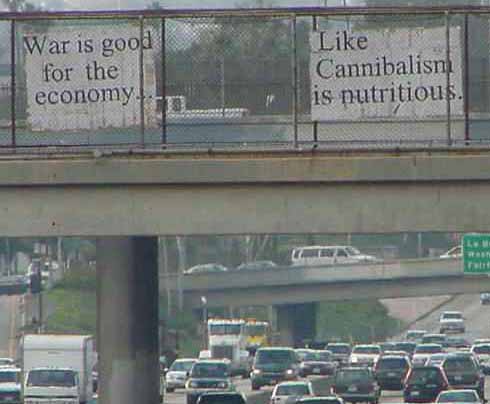
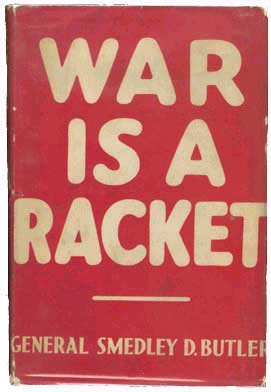
And his middle name was Darlington!
i recently inherited of my step-grandfathers pocket sized war dictionaries. he died about a year ago. i also recently found out that my blood grandfather is buried somehere here: http://www.cwgc.org/cwgcinternet/cemetery_plans.aspx?cemetery=92002&mode=1
it never occured to me that soldiers would carry dictionaries. inscribed in both the french/english and german/english dictionaries was "Edward M. Seymour, Cairo '44"
it brings to mind two (non-nostalgia related) things for me. 1) another method of body indentification and 2) the need to communicate with the captured and vice versa. i expect they have some pocket better than babelfish translation gizmo now.
i'm wondering do they chip soldiers like they chip pets nowadays?
Thanks for that link, Myfanwy, (and here is a toast for Gramps):
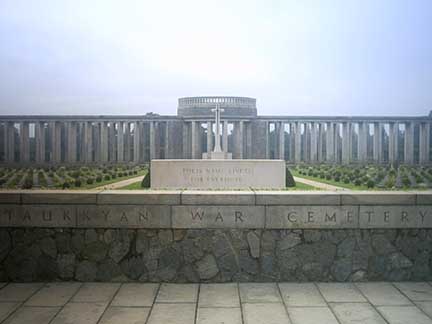
"TAUKKYAN WAR CEMETERY is the largest of the three war cemeteries in Burma (now Myanmar). It was begun in 1951 for the reception of graves from four battlefield cemeteries at Akyab, Mandalay, Meiktila and Sahmaw which were difficult to access and could not be maintained. The last was an original 'Chindit' cemetery containing many of those who died in the battle for Myitkyina. The graves have been grouped together at Taukkyan to preserve the individuality of these battlefield cemeteries Burials were also transferred from civil and cantonment cemeteries, and from a number of isolated jungle and roadside sites. Because of prolonged post-war unrest, considerable delay occurred before the Army Graves Service were able to complete their work, and in the meantime many such graves had disappeared. However, when the task was resumed, several hundred more graves were retrieved from scattered positions throughout the country and brought together here. The cemetery now contains 6,374 Commonwealth burials of the Second World War, 867 of them unidentified."
I doubt that they are chipped. I have read that they do get some hurried courses for a few Arabic words. (I suspect they are still carrying those dictionaries.) I'll check on Phil Carter's blog, he was recently deployed to Iraq, and he does describe their kits.
|
"We feel in wartime comradeship. We confuse this with friendship, with love. There are those who will insist that the comradeship of war is love—the exotic glow that makes us in war feel as one people, one entity, is real, but this is part of war's intoxication. Think back on the days after the attacks on 9-11. Suddenly we no longer felt alone; we connected with strangers, even with people we did not like. We felt we belonged, that we were somehow wrapped in the embrace of the nation, the community; in short, we no longer felt alienated. As this feeling dissipated in the weeks after the attack, there was a kind of nostalgia for its warm glow and wartime always brings with it this comradeship, which is the opposite of friendship.
Friends are predetermined; friendship takes place between men and women who possess an intellectual and emotional affinity for each other. But comradeship—that ecstatic bliss that comes with belonging to the crowd in wartime—is within our reach. We can all have comrades. The danger of the external threat that comes when we have an enemy does not create friendship; it creates comradeship. And those in wartime are deceived about what they are undergoing. And this is why once the threat is over, once war ends, comrades again become strangers to us. This is why after war we fall into despair."
-from a text of a speech by Chris Hedges
(author of "War is a Force That Gives Us Meaning")
- L.M. 11-11-2005 9:50 am
yikes! Happy Creepy Remembrance Day.
- sally mckay 11-11-2005 8:33 pm
I used to torture friends and family by reciting Flander's Fields at top speed over and over and over. Chalk it up to youthful cynical exuberance. I stopped doing it recently when I fell in love with a 2nd generation European. WW II feels closer to me these days than it ever has before, and my old, glib irreverence is shifting into something more like fretful curiosity.
- sally mckay 11-11-2005 8:37 pm
I think it's a dreadful poem, and I remember having to memorize it as well. I have a pretty good grasp of WW2 history, though more about the European war than the Pacific war (Americans have a better handle on the Pacific, although very early on Canadians were imprisoned in Hong Kong as the result of a hopeless operation directed by the Brits).
It's WW1 that still eludes my understanding (and most historians). Margaret MacMillan's book "Paris 1919" is a great source for an analysis of the peace talks that followed that war and all it's consequences for the 20th & 21st century.
Like the English, I still think that WW2 is a current event, but after reading MacMillan's book and finding out that Iraq, and many of the Gulf oil states had their beginnings negotiated by the Brits, French, Americans and Italians, I'm willing to say that WW1 is also a current event.
- L.M. 11-11-2005 9:09 pm
I should qualify my "pretty good grasp" claim, because I learn something new about the world wars all the time. I recently read a book called "Dangerous Patriots" (that Sally lent me) about the secret war-time internment of Canadian labour organizers and communist party members, and it pointed out that prior to WW2 the Soviets had campaigned to the League of Nations for a pact to stop Nazi aggression. The European nations had refused, in the hope that the Nazis would turn their war machine on the Soviets. I had known that business & Industry leaders were more threatened by Communism than by Fascism, but I had never made the connection between those motivations and Chamberlain's Munich Pact with Hitler, paving the way to the Nazi take over of Czechoslovakia.
(so I mention this tidbit one day to Von Bark, and he said, "yes, I knew that.")
- L.M. 11-11-2005 9:43 pm
Well that's extremely interesting (I didn't read that book myself). LM, you and VB both have encyclopedic data banks in your brains. I am in constant awe.
- sally mckay 11-11-2005 10:27 pm
Don't be in awe, of me anyway, I read way too fast, copy and paste a lot and ultimately retain very little.
- L.M. 11-11-2005 11:15 pm
I haven't read MacMillan's book yet but John Cale's album 'Paris 1919' is really cool.
- Von Bark
- sally mckay 11-11-2005 11:58 pm
I finally found this quote, I was thinking of it while I was collecting war grave images. It's from Rich Tillman's eulogy delivered at the funeral for his brother, Pat Tillman, the American athlete turned soldier, who was killed (by friendly fire) in an ambush in Afghanistan in the Spring of 2004.
"Thanks Pat. I didn't write shit because I'm not a writer. I'm not just going to sit here and break down on you. But thanks for coming. Pat's a fucking champion and always will be. Just make no mistake, he'd want me to say this: He's not with God. He's fucking dead. He's not religious. So, thanks for your thoughts, but he's fucking dead."
- L.M. 11-12-2005 12:45 am
The great lesson of the War to End All Wars is that they don't. From WW2, to the breakup of Yugoslavia to Gulf Wars 1 and 2, it's clear that war usually begets war. Sometimes (e.g. France v. Germany) people show enough enlightenment to break the cycle.
BTW, a great uncle survived WW1, and went on to die of the Spanish flu. Catch-22. That's some catch.
- mark 11-12-2005 1:33 am
Hey Mark, I did read that the Spanish Flu killed more people that WW1.
I'm not going to peg France & Germany's current civil relationship as a result of their enlightenment. We actually have to give credit to the Americans for that.
The Marshall Plan was designed to rebuild the European economy in the image of American Capitalism before Stalin could take advantage of post war instability. It was a disgustingly expensive enterprise for the Americans, but they had learned some lessons from the WW1 peace agreements. (But I don't buy the argument that the Versailles treaty calling for enormous payments from Germany to the victorious European nations crippled Germany's economy and directly resulted in WW2. From what I have read, the payments stopped in the early thirties, and Germany started building up their armed forces and dressing them in gorgeous Hugo Boss uniforms with those full length leather trench coats. They found the money for that even before they discovered the economic advantages of slave labour).(But correct me if I am wrong)
A few years ago, on my favourite TVO program, Diplomatic Immunity, they discussed the historical impact of WW1. Aside from some dark humour about "the war to end all wars", one of the panel members pointed out that in the 20th century, Germany started two huge wars in order to dominate Europe, they lost both of them, and still ended up the dominant economic power in the new European Union at the end of the century.
- L.M. 11-12-2005 2:51 am
freeway blogger:

- sally mckay 11-12-2005 7:01 am
And his middle name was Darlington!
- L.M. 11-12-2005 7:58 am
i recently inherited of my step-grandfathers pocket sized war dictionaries. he died about a year ago. i also recently found out that my blood grandfather is buried somehere here: http://www.cwgc.org/cwgcinternet/cemetery_plans.aspx?cemetery=92002&mode=1
it never occured to me that soldiers would carry dictionaries. inscribed in both the french/english and german/english dictionaries was "Edward M. Seymour, Cairo '44"
it brings to mind two (non-nostalgia related) things for me. 1) another method of body indentification and 2) the need to communicate with the captured and vice versa. i expect they have some pocket better than babelfish translation gizmo now.
i'm wondering do they chip soldiers like they chip pets nowadays?
- myfanwy (guest) 11-13-2005 3:45 am
Thanks for that link, Myfanwy, (and here is a toast for Gramps):

"TAUKKYAN WAR CEMETERY is the largest of the three war cemeteries in Burma (now Myanmar). It was begun in 1951 for the reception of graves from four battlefield cemeteries at Akyab, Mandalay, Meiktila and Sahmaw which were difficult to access and could not be maintained. The last was an original 'Chindit' cemetery containing many of those who died in the battle for Myitkyina. The graves have been grouped together at Taukkyan to preserve the individuality of these battlefield cemeteries Burials were also transferred from civil and cantonment cemeteries, and from a number of isolated jungle and roadside sites. Because of prolonged post-war unrest, considerable delay occurred before the Army Graves Service were able to complete their work, and in the meantime many such graves had disappeared. However, when the task was resumed, several hundred more graves were retrieved from scattered positions throughout the country and brought together here. The cemetery now contains 6,374 Commonwealth burials of the Second World War, 867 of them unidentified."
I doubt that they are chipped. I have read that they do get some hurried courses for a few Arabic words. (I suspect they are still carrying those dictionaries.) I'll check on Phil Carter's blog, he was recently deployed to Iraq, and he does describe their kits.
- L.M. 11-13-2005 9:07 am